Navigating the multitude of options for parasite prevention can be overwhelming for any dog owner. From heartworm to fleas and various intestinal worms, protecting your canine companion requires a strategic approach. This guide aims to demystify the choices, focusing on the Best Worming And Flea Tablets For Dogs available in the market, along with other effective treatments. We’ll explore combination therapies that simplify your routine, as well as specialized products for specific parasitic threats. Making an informed decision ensures your dog remains healthy, happy, and free from the discomfort and dangers of parasites.
Understanding the different types of parasites and their prevention methods is crucial. Heartworm, transmitted by mosquitoes, can be life-threatening if left untreated. Fleas are not just an itchy nuisance; they can cause skin allergies, transmit diseases, and lead to tapeworm infections. Intestinal worms like roundworms, hookworms, whipworms, and tapeworms can cause a range of health issues, from digestive upset to nutrient deficiencies. Fortunately, advancements in veterinary medicine offer highly effective preventative solutions, often in convenient tablet or chewable forms. For monthly preventative care that combines essential treatments, consider exploring options for flea and worm treatment for dogs monthly.
Comprehensive Protection: Combined Worming and Flea Tablets for Dogs
Modern veterinary medicine has made parasite control easier than ever with all-in-one or broad-spectrum treatments. These products often combine ingredients to tackle fleas, various intestinal worms, and heartworm, providing comprehensive protection with a single, convenient dose. This section highlights some of the leading combined worming and flea tablets and chews that simplify your dog’s preventative care regimen. Always consult your veterinarian to determine the most suitable product for your pet, especially considering their age, weight, health history, and local parasite prevalence.
Simparica® Trio
Simparica Trio is a highly regarded monthly chew that offers extensive protection. It prevents heartworm disease, effectively kills fleas, and treats a broad spectrum of intestinal worms, including roundworms and hookworms, though it does not cover tapeworms. This palatable chew is also effective against paralysis ticks, making it an excellent choice for dogs in tick-prone areas. Its convenience and broad-spectrum action make it a popular option for busy pet owners.
This product can be administered to puppies from 8 weeks of age, provided they weigh over 1.25 kg. While incredibly effective, it’s important to note that safety has not been fully evaluated in pregnant, breeding, or lactating dogs, so veterinary consultation is essential for these specific cases. The ease of administration as a flavored chew means no messy topical applications and no restrictions on bathing, ensuring continuous protection regardless of your dog’s activities.
Nexgard® Spectra
Nexgard Spectra is another excellent choice for combined parasite control, delivered as a monthly meaty chew. It protects against heartworm, kills fleas, and treats most common intestinal worms (excluding tapeworm). Beyond these primary parasites, Nexgard Spectra also targets mange caused by demodex and sarcoptes mites, and even treats ear mites. This makes it a multi-faceted solution for a range of common canine ailments.
It can be safely used in puppies from 8 weeks of age and weighing over 2 kg. One of its significant advantages is that it is deemed safe for use in breeding, pregnant, and lactating female dogs, offering peace of mind for breeders. However, safety in breeding males has not been evaluated. Like Simparica Trio, its chewable form eliminates issues with topical applications, ensuring consistency and efficacy. Many veterinarians consider this one of the best flea and worm treatment for dogs for its comprehensive coverage.
Credelio Plus®
Credelio Plus is a monthly meaty chew that provides robust protection against fleas, ticks, and heartworm disease. It is a highly effective flea control solution and also works against paralysis ticks. This product offers the convenience of an oral treatment with no restrictions on bathing, which is ideal for active dogs or those that require frequent grooming. Its targeted action ensures your dog is protected from some of the most common and dangerous external and internal parasites.
Dogs can start using Credelio Plus from 8 weeks of age, provided they weigh more than 1.4 kg. Owners should exercise caution when administering Credelio Plus to dogs with a history of seizures, as it may exacerbate such conditions. Similar to some other combination products, its safety has not been evaluated in pregnant, breeding, or lactating dogs, necessitating professional veterinary advice before use in these animals.
Comfortis® Plus (formerly Panoramis)
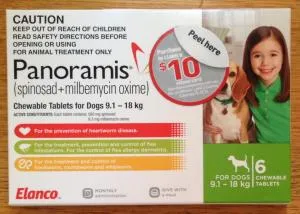 Dog receiving a Comfortis Plus tablet from an owner, illustrating oral medication for comprehensive parasite prevention.
Dog receiving a Comfortis Plus tablet from an owner, illustrating oral medication for comprehensive parasite prevention.
Comfortis Plus is a monthly tablet that delivers highly effective control against fleas and heartworm, while also treating most intestinal worms (except tapeworm). It’s a reliable choice for combined protection, and its oral administration means no topical mess. For complete intestinal worm protection, veterinarians typically advise supplementing with a tapewormer every six months.
This product is recommended for dogs from 14 weeks of age. A crucial warning for owners of Collies or Australian Shepherds: Comfortis Plus is generally not recommended for these breeds due to potential sensitivities related to the MDR1 gene. There can also be serious interactions with off-label doses of ivermectin, so always inform your vet if your dog is on Comfortis Plus. If a dog has missed heartworm prevention doses, a blood test is required before initiating treatment. Safety in breeding, pregnancy, and lactation has not been established.
Sentinel®
Sentinel is a monthly tablet given with food, providing protection against heartworm, fleas (by sterilizing them), and a wide range of intestinal worms. It’s a convenient option for comprehensive internal parasite control. Its method of flea control is unique; it sterilizes adult fleas, preventing them from reproducing, which helps to break the flea life cycle in the environment. This makes it an environmentally friendly option for flea management.
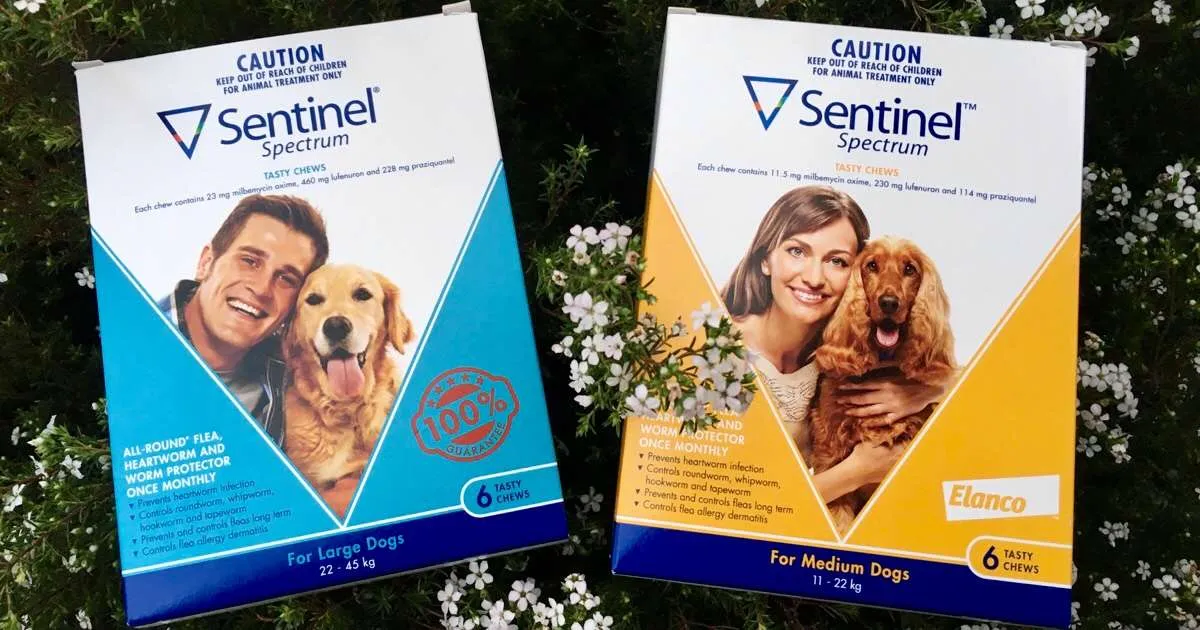 Brown dog looking attentive next to a box of Sentinel Spectrum parasite prevention tablets, highlighting monthly care.
Brown dog looking attentive next to a box of Sentinel Spectrum parasite prevention tablets, highlighting monthly care.
Sentinel is safe for puppies as young as 6 weeks of age and for breeding dogs. Its safety in pregnancy and lactation has also been established, making it a versatile choice. However, because it sterilizes rather than immediately kills fleas, dogs frequently exposed to heavily infested environments, such as dog parks, might still benefit from additional or faster-acting flea treatments. As with other heartworm preventatives, a blood test is essential for dogs who have missed doses to ensure they are heartworm-free before starting.
Additional Heartworm Prevention Products
While many “best worming and flea tablets for dogs” now offer combined protection, heartworm disease remains a severe threat that sometimes requires dedicated prevention. These products primarily target heartworm, offering excellent protection, but may require supplementary treatments for fleas and intestinal worms.
Proheart® SR12 Once a Year Injection
For ultimate convenience and peace of mind, the Proheart SR12 injection offers year-round heartworm protection with a single dose. This annual injection of moxidectin provides continuous coverage, eliminating the need for monthly reminders. It is the most popular heartworm prevention choice for many veterinarians and pet owners due to its guaranteed, consistent protection.
This injection can be safely started at 6 months of age and can be conveniently scheduled with your dog’s annual vaccinations. It’s safe for dogs who may have missed previous prevention doses (though testing is still advised), and it can be used in breeding dogs, during pregnancy, and lactation. While it offers brief protection against hookworm, dogs receiving Proheart SR12 will still need monthly flea control and intestinal worming every three months to ensure complete parasite protection.
Advocate®
Advocate is a monthly spot-on treatment that prevents heartworm, effectively controls fleas, and treats certain intestinal worms, along with most mites (including ear mites and sarcoptic mange). It’s particularly useful for treating puppies infested with ear mites or dogs exposed to sarcoptic mange. It also aids in the control of demodectic mange. This topical solution provides rapid flea control and comprehensive internal parasite protection.
Advocate can be used from 7 weeks of age. Dogs can be bathed 48 hours after application, but frequent bathing may reduce its flea control efficacy. Owners should be careful during application as the solvent can damage clothing and painted surfaces, and prevent the animal from licking the application site. While it covers several worms, additional intestinal worming tablets every three months are highly recommended for comprehensive coverage, especially for tapeworms. Safety during pregnancy has not been definitively established, requiring veterinary consultation.
Standalone Flea and Tick Treatments
Even when focusing on the best worming and flea tablets for dogs, some owners might prefer separate treatments for fleas and ticks, or their dog might have specific needs not met by all-in-one products. These options are highly effective for external parasite control and are typically used in conjunction with a heartworm preventative and intestinal wormer. It’s crucial to treat all pets in a household to effectively control fleas. Systemic (tablet) treatments are often considered more environmentally friendly than topical applications.
Simparica®
Simparica is a monthly chewable tablet solely focused on external parasites: fleas, mites, and ticks. It offers highly effective flea control and is registered for treating demodectic mange, sarcoptic mange, and ear mites. Importantly, it is effective against paralysis ticks, providing essential protection in high-risk areas. This chew is a powerful tool for external parasite management without heartworm or broad intestinal worm components.
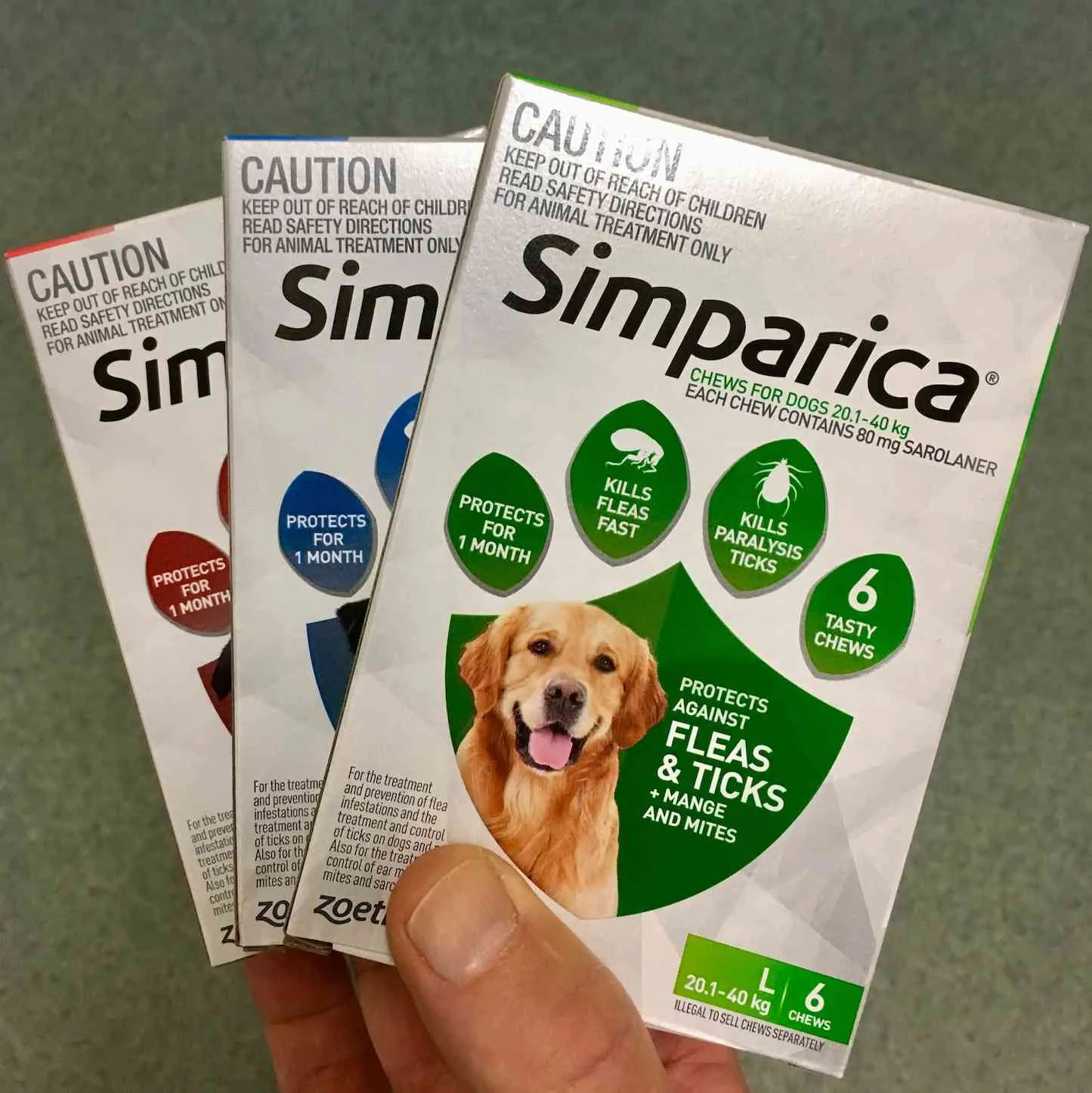 Simparica box for dogs, highlighting its protection against fleas, mites, and ticks.
Simparica box for dogs, highlighting its protection against fleas, mites, and ticks.
Simparica can be used in puppies and dogs from 8 weeks of age and weighing over 1.3 kg. As with many new medications, its safety profile has not been evaluated for breeding, pregnant, or lactating dogs, making veterinary advice essential for these groups. Owners should always be aware of potential side effects, and your vet can discuss these in detail, especially concerning tick prevention and neurological concerns.
Bravecto®
Bravecto offers exceptionally long-lasting protection against fleas and ticks, available in two convenient forms: a chewable tablet providing 3 months of flea and 4 months of tick control, or a spot-on pipette offering 6 months of both. This extended protection is a significant advantage for owners who prefer less frequent dosing. The chewable form also treats demodectic and sarcoptic mange and ear mites.
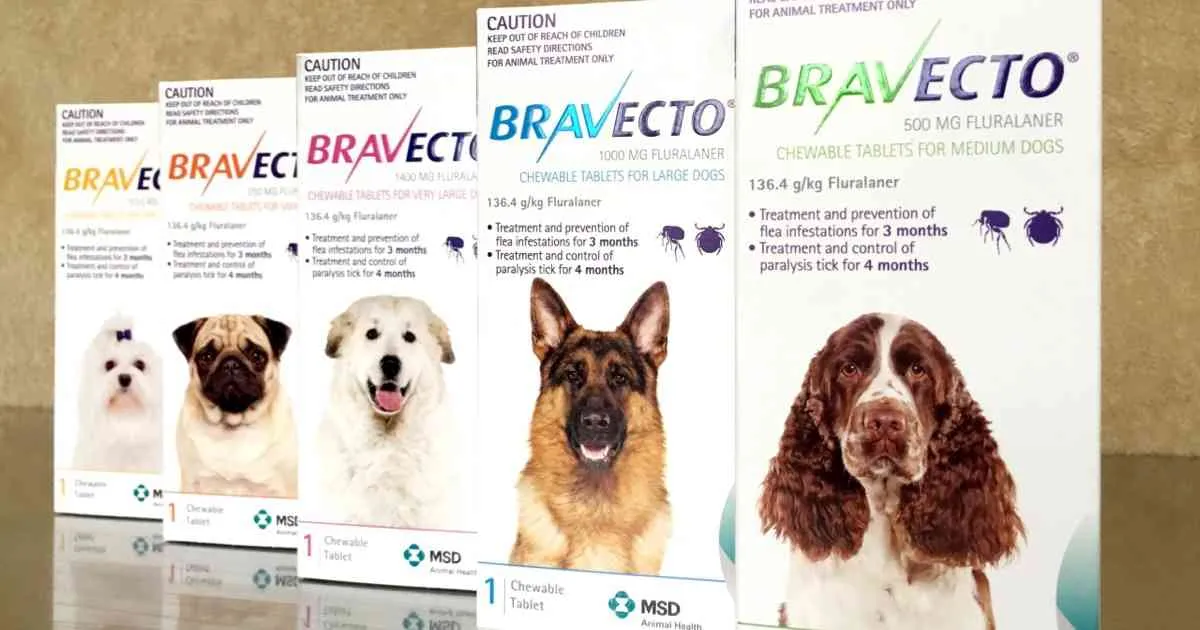 Bravecto chewable tablet for dogs, showcasing a single dose for extended flea and tick protection.
Bravecto chewable tablet for dogs, showcasing a single dose for extended flea and tick protection.
Bravecto can be used in puppies from 8 weeks of age and weighing over 2 kg. However, due to significant weight changes in young puppies, accurate long-term dosing can be challenging, so some veterinarians recommend starting it at or after 6 months of age. It is safe for use in breeding, pregnant, and lactating animals, making it a flexible option. Always administer the chew with a meal to ensure optimal absorption.
Nexgard®
Nexgard is a monthly meaty chew designed for highly effective flea control. It also provides protection against paralysis ticks, which is vital for dogs residing in or traveling to tick-endemic regions. This chewable format offers mess-free administration and no restrictions on bathing, ensuring consistent protection. It’s a strong contender for flea and tick prevention when a separate heartworm and worming strategy is preferred.
Nexgard can be used in dogs from 8 weeks of age and over 2 kg. It is also safe for use in breeding, pregnant, and lactating females, although safety in breeding males has not been evaluated. Owners of dogs with a history of seizures should use Nexgard with caution, as it belongs to a class of drugs that may exacerbate these conditions. Always discuss your dog’s full medical history with your vet before starting any new medication.
Credelio®
Credelio is a monthly meaty chew that offers highly effective flea control and is also active against paralysis ticks. Like Nexgard, its oral administration provides a clean, mess-free solution without affecting bathing routines. It’s a reliable choice for targeting external parasites, making it suitable for owners who prefer to manage heartworm and intestinal worms with different products.
Credelio can be used in puppies from 8 weeks of age and over 1.3 kg. Similar to other isoxazoline-class drugs, it should be used with caution in dogs with a history of seizures. Safety has not been evaluated in pregnant, breeding, or lactating dogs, so veterinary guidance is necessary for these specific cases.
Seresto®
Seresto is an insecticide-impregnated collar offering long-lasting protection against fleas for up to 8 months and ticks for up to 4 months. This collar provides a continuous release of active ingredients (imidacloprid and flumethrin), ensuring ongoing protection without the need for monthly applications. It’s an excellent option for owners seeking extended, hands-off parasite control.
Seresto collars can be used on dogs from 7 weeks of age. While effective, safety during pregnancy has not been established, so consultation with a vet is advisable for pregnant bitches. The collar design means no oral medication or topical liquids, which can be beneficial for dogs sensitive to those forms or owners who find them difficult to administer.
Dedicated Intestinal Worming Products
Even with the availability of the best worming and flea tablets for dogs offering comprehensive protection, some scenarios call for dedicated intestinal worming treatments. This could be due to specific worming schedules, a need to treat tapeworm when combination products don’t, or simply a preference for separate parasite management. There are four primary intestinal worms to consider: roundworm, hookworm, whipworm, and tapeworm. Regular deworming is essential for your dog’s health, particularly following a schedule of every two weeks until 12 weeks, then monthly until 6 months, and every three months for life.
Milpro®, Milbemax® etc.
Milpro, Milbemax, and similar generic formulations are popular and highly effective intestinal worming tablets. They typically contain milbemycin and praziquantel, which together target a broad spectrum of intestinal worms, including roundworm, hookworm, whipworm, and tapeworm. These small tablets are often flavored, making them easy to hide in food, and a single tablet can treat dogs up to 25kg, simplifying dosing.
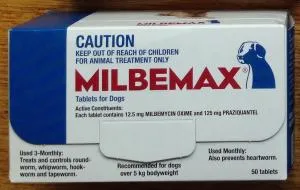 Milbemax dog wormer package and tablets, emphasizing effective treatment for intestinal worms.
Milbemax dog wormer package and tablets, emphasizing effective treatment for intestinal worms.
These products follow the standard deworming schedule mentioned above. Importantly, if given monthly, some formulations containing milbemycin can also serve as heartworm prevention. However, a blood test for heartworm is crucial before starting a monthly regimen if your dog may have missed previous prevention doses. Milpro and Milbemax are generally safe for pregnant bitches, making them a trusted choice for breeding programs. Ensure you understand how worms can be passed from dog to dog before establishing a prevention schedule. can worms be passed from dog to dog
Drontal®
Drontal is a well-known original brand name all-wormer, available in tablets, drops, and flavored chews. It contains various active ingredients, commonly including praziquantel and pyrantel, to ensure highly effective treatment against all major intestinal worms: roundworm, hookworm, whipworm, and tapeworm. Its long-standing reputation and various formulations make it a staple in many pet care routines.
Drontal adheres to the recommended deworming schedule for puppies and adult dogs. It is also safe for use during pregnancy, providing peace of mind for breeders. Due to its effectiveness and various forms, Drontal and its generic equivalents are widely trusted by veterinarians and pet owners for comprehensive intestinal worm control. Always follow the dosing instructions carefully and consult your vet if you have any concerns about the side effects of hookworm medicine for dogs.
Conclusion
Choosing the best worming and flea tablets for dogs is a critical aspect of responsible pet ownership. The array of products available, from all-in-one monthly chews to specialized treatments, ensures that every dog’s unique needs can be met. Products like Simparica Trio, Nexgard Spectra, and Credelio Plus offer broad-spectrum protection against heartworm, fleas, and most intestinal worms in a single, convenient dose, simplifying your routine. For owners who prefer annual heartworm injections or dedicated solutions for external parasites, options like Proheart SR12, Bravecto, or Seresto collars provide tailored protection.
Remember that a consistent parasite prevention program is essential for your dog’s long-term health and wellbeing. Always consult your veterinarian to create a customized parasite control plan that considers your dog’s age, weight, lifestyle, geographical location, and any pre-existing health conditions. Regular veterinary check-ups and diagnostic tests are also vital to ensure the continued effectiveness of your chosen treatments and to promptly address any emerging parasite challenges.
References
- Walkerville Vet. (2023). Flea, Heartworm and Worming for Dogs. Retrieved from https://www.walkervillevet.com.au/blog/flea-heartworm-and-worming-for-dogs/
- Veterinary medical guidelines and product information from trusted pharmaceutical manufacturers.
